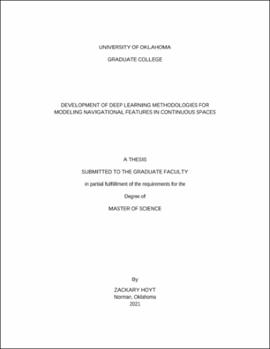| dc.contributor.advisor | Hougen, Dean | |
| dc.contributor.author | Hoyt, Zackary | |
| dc.date.accessioned | 2021-12-17T22:24:47Z | |
| dc.date.available | 2021-12-17T22:24:47Z | |
| dc.date.issued | 2021-12 | |
| dc.identifier.uri | https://hdl.handle.net/11244/332393 | |
| dc.description.abstract | This thesis proposes generalized methodologies to model navigational features of continuous spaces using deep learning architectural approaches. Navigational features impact how an entity can effectively travel within a space, such as environmental hazards in the space. Deep learning is a subset of machine learning that utilizes artificial neural networks to effectively solve stochastic optimization problems. Modeled navigational features can be used in conjunction with deep learning architectures to solve stochastic optimization problems in the domain of navigation, such as developing navigational solutions that detail how to effectively travel from one point to any other reachable point in the navigable space.
Deep learning architectural approaches are explored to generate airspace navigational solutions from modeled airspace navigational features as a means to evaluate the proposed deep learning modeling methodologies. An airspace scenario generator is designed and developed to procedurally generate stochastic scenarios of spatial airspace data. Techniques are developed to deterministically convert these scenarios into corresponding navigational solutions to support a supervised learning approach. To evaluate the predictions of trained models against the actual navigation solutions, new statistical measures are introduced to better measure the accuracies and coherences of the models by accounting for both positional distributions and biases in the predictions. Multiple comparable architectural approaches are provided with detailed implementations that empirically demonstrate this capability successfully.
Index Terms—Artificial Intelligence; Autonomous Agents; Deep Learning; Machine Learning; Continuous Spaces; Autonomous Navigation; Automated Routing | en_US |
| dc.language | en_US | en_US |
| dc.rights | Attribution 4.0 International | * |
| dc.rights.uri | https://creativecommons.org/licenses/by/4.0/ | * |
| dc.subject | Deep Learning | en_US |
| dc.subject | Machine Learning | en_US |
| dc.subject | Autonomous Navigation | en_US |
| dc.title | Development of Deep Learning Methodologies for Modeling Navigational Features in Continuous Spaces | en_US |
| dc.contributor.committeeMember | Nicholson, Charles | |
| dc.contributor.committeeMember | Christopher, Grant | |
| dc.date.manuscript | 2021-12 | |
| dc.thesis.degree | Master of Science | en_US |
| ou.group | Gallogly College of Engineering | en_US |

